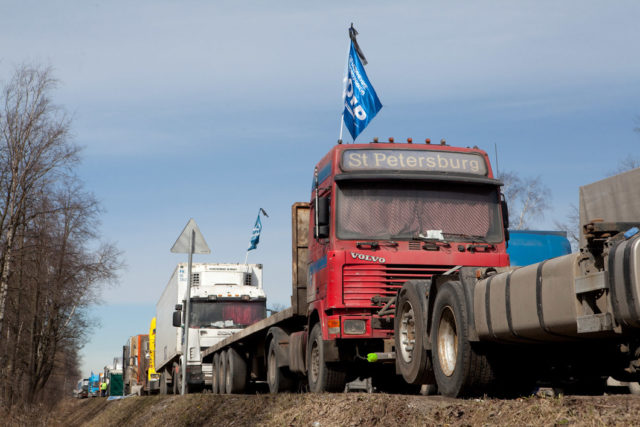
Russian Truckers Declared ‘Foreign Agents’
By:

Following an inspection by the Ministry of Justice, the Russian truckers organization Association of Russian Carriers (Obedinenie Perevozchikov Rossii—OPR) has been declared a “foreign agent.” The organization was originally formed to protest the introduction of the Platon toll system in 2015 (see EDM, November 30, 2015). The truckers were included on the register of foreign agents following an unscheduled audit of their documentation. A spokesperson from the organization, Andrei Buzhatin, said that the reasons for their inclusion on the register are unclear: “We had a check from the Ministry of Justice, and they told me that they sent us the verification materials three days ago, but we do not know why they requested this, as we generally have no contacts with foreigners” (Newsland.com, December 1). The instructions to register came after a meeting underneath the New Year Tree on Lenin Square, in St. Petersburg, where the truckers came to demonstrate against once more against the Platon toll system. Platon “is not aimed at regulating our roads,” the protesters declared, “It is just a plunder of our country. Because of the Platon system, goods have increased in value two or three times. All of this money comes out of our pockets” (Newsland.com, November 27).
In an interview with the venerable liberal newspaper Novaya Gazeta, Buzhatin said, “We are planning a new strike from December 15 to 25. The authorities are again trying to raise fines for non-participation in the Platon system—from 5,000 to 20,000 rubles [$85–$340]. This has outraged carriers, not only members of the OPR. But this is not the only reason. Also, the excise duty is rising. This, like Platon, affects every person in Russia. There are also other problems in our industry. The Ministry of Transport recently invented a regular check of professional fitness, as well as divisions between private entrepreneurs and professional drivers. Specialists who talk about such criteria are clearly divorced from reality.” Promising to “stop the traffic as much as possible… [and] everywhere we will set up protest camps,” Buzhatin continued to criticize as counterproductive the authorities’ approach to the protesters, saying, “You can drive us away as much as you like, but it is silly. As practice shows, this does nothing for the punishers, and we just add OPR members. Fighting with your own people is wrong. Maybe they will be able to intimidate someone, but this does not solve the problem. Already today in our industry there are radical people who are tired of everything. We, as a union, are trying to establish with them some contact, to restrain their protest. But no one knows in what “partisan” direction these people will turn. It is very difficult to understand what motivates the authorities in our country” (Novaya Gazeta, December 5). Thus, the actions of the authorities may be creating the very threat they seek to fight against.
The truckers initially became a source of opposition to the Kremlin over plans to introduce the “Platon” system to track and tax Russian long-distance drivers. The system is said to be owned in part by Igor Rotenburg, the son of a close friend of Vladimir Putin, Arkady Rotenburg (see EDM, November 30, 2016). The truckers’ strike has been endorsed by opposition leader Alexei Navalny. And in the battle for hearts and minds ahead of the election (if Navalny is permitted to run), his influence could be important. Indeed, in the restricted Russian political landscape, social/economic protest has become one of the only ways in which opposition to the authorities can be given voice. The truckers, moreover, appear to be one of the few organizations capable of generating truly national opposition to the system—as witnessed by the March 2017 demonstrations, which saw more than 10,000 drivers participate in protest actions throughout Russia, including in St. Petersburg, Kazan and Primorsky (Gordonua.com, March 27). The irony is that the while the West has tried to increase pressure on the Putin regime through external sanctions, the latter’s own short-sighted and avaricious actions may actually create far more significant problems.



